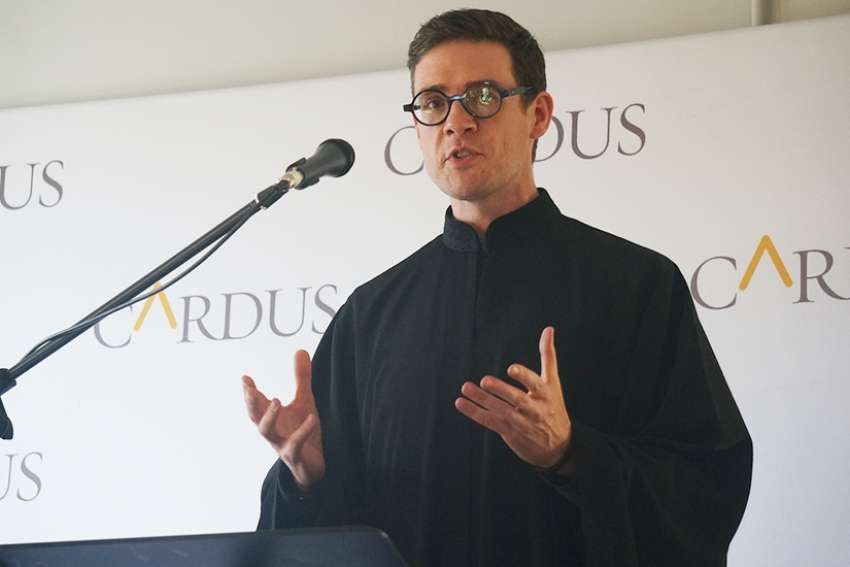Fr. Deacon Andrew Bennett heads the initiative, which is tasked to “re-present” why religious freedom is important, “not only for Christians but for all people.”
“If we can’t live out our faith in the public square, how do we built a truly pluralistic Canada,” said the former Ambassador of Religious Freedom at a pre-launch reception May 8.
Bennett described an “amnesia” about the contributions of faith communities to Canada’s common life. The Ukrainian Greek Catholic deacon said Catholics “are exhibit A.”
“We have bought into the Enlightenment myth that religion is a private matter,” he said. “Our baptism is not a private matter. We are called to live it out.”
But living it out has become more difficult in both in Canada and elsewhere around the world.
Co-founder and president of Cardus, Michael Van Pelt, said when he and Ray Pennings founded the think tank in 2004 “religious freedom was not the order of the day.”
“Sadly, now it is,” he said.
In a global context, 79 per cent of the world’s population live in countries where religious freedom is severely curtailed by governments or by social hostility, Van Pelt said. “That’s a 10 per cent increase since 2009.”
One out of 12 Christians world-wide are either persecuted by their governments or by social violence, he said.
And while Canadians have much to be grateful for, “our freedoms need to be attended to to prevent backsliding or even open contempt,” he said.
Pennings said the initial concern in founding Cardus was to help Christians occupy their place in the public square, to equip them with arguments from 2,000 years of Christian social thought.
But the culture has changed, he said. “Not only do we need to occupy this space; we need to defend it.”
“Faith is not just a private matter,” he said. “Religious freedom is not something the government gives to us. It comes from our very creation.”
The Institute hopes to regularly replicate something similar to a gathering of 70 youth from different faiths and backgrounds who convened as part of Faith in Canada 150 to mark Canada’s 150th birthday.
These young people were given questions to ask those of other faiths, and encouraged to share openly about their differences, Bennett said.
The Institute wants to replicate that event to “tell young people that no matter what the zeitgeist, you can be faithful publicly and be witnesses to that faith,” Bennett said.
The institute will also offer policy advice to governments on how to respond to religious freedom violations overseas and liaise with religious freedom scholars elsewhere in the world.
The Institute will publish policy papers and released on May 9 tracing the history of religious freedom in Canada.
That paper starts with the Quebec Act of 1774 that granted Catholics civil rights “for the first time in the whole British Empire,” Bennett said. It looks at the darker side of religious freedom, such as the banning of the potlatch ceremony of Indigenous Canadians and the legacy of the residential schools. But it also looks at the fact many First Nations peoples are “deeply Christian,” something that gets overlooked today, he said. And the paper talks about the key religious freedom cases that have come before the Supreme Court of Canada, including the Trinity Western University law school case that is yet to be decided.
Starting in 2019 it will begin a series of training modules on religious freedom.
These modules, meant to train the trainers, will explain what religious freedom is, show ways to further it; and help people to live with others with profoundly different beliefs, Bennett said.
Canadians are known to be very polite, Bennett said, “But sometimes this can be a vice.”
Because of politeness people do not engage because of sometimes sharp differences, he said.
The way to engage these differences is to always recognize the image of God in the other person, Bennett said, noting advancing human dignity would be the “touchstone” of the Institute.
“We are not objects; we are subjects,” Bennett stressed.
Cardus launches Religious Freedom Institute headed by Andrew Bennett
By Deborah Gyapong, Canadian Catholic NewsOTTAWA – In the face of persistent assaults on religious freedom and its place in the Canada’s public square, the Christian think tank Cardus has established the Cardus Religious Freedom Institute.
Please support The Catholic Register
Unlike many media companies, The Catholic Register has never charged readers for access to the news and information on our website. We want to keep our award-winning journalism as widely available as possible. But we need your help.
For more than 125 years, The Register has been a trusted source of faith-based journalism. By making even a small donation you help ensure our future as an important voice in the Catholic Church. If you support the mission of Catholic journalism, please donate today. Thank you.
DONATE

